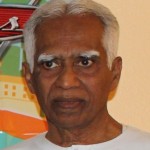Modi Wave Has Struck A Chord
 Narenrda Modi is riding the crest of his creation. The wave originating from Gujerat, will in four months have ripple effects in the South as well, reaching up to Tamil Nadu. Seats to be won in the South may be limited, but coalition support pre and post-election can be substantial and may even be enduring.
Narenrda Modi is riding the crest of his creation. The wave originating from Gujerat, will in four months have ripple effects in the South as well, reaching up to Tamil Nadu. Seats to be won in the South may be limited, but coalition support pre and post-election can be substantial and may even be enduring.
Modi’s whirlwind electioneering had created a stir in India from the day his candidature was announced in September this year. Unprecedented turnouts and people’s enthusiasm had driven BJP’s morale very high. It got transmitted to the voters countrywide. Yet people in all the states weighed the prospects in measured tones, waiting for the outcome in the five States. These five have emerged as a microcosm of the Indian polity reflecting the mood and the will of the nation. With results for four states being released, the total seats won by BJP, the 1st Party are more than comparable and much higher when matched against the 1st Party in the 2003 & 2008 Assembly elections.
Did the haze prevailing till the 7th clear on 8th December either in full or in part? What do the results portend for Lok Sabha next April? For a dispassionate inquiry the picture is now less unclear. Even so in our reasoning process, we have to rid our minds of preconceived baggage, that of incumbency. What does Malaysia tell us? The same party or coalition was voted in 13 times in a row. In Singapore, PAP rules continuously since independence in 1965. Governments that govern and deliver, have the endorsement of the people. ‘Incumbency Factor’ is facilely conjured up and blithely advanced as deciding the throwing away of the lack lustre non – performers.
Why go far? In India itself for 30 years at a stretch from 1947 to ’77, Congress held power, winning 7 elections in a row. Aura of the leaders, charismatic leadership, respectable performance and clean hands at centre and state explain. The same phenomena account for Modi’s 3 consecutive victories. In economic management Gujarat ranks first in the country, inspiring hope in many states outside. The above account renders incumbency a non-issue.
If this perception finds acceptance, then where do we seek to find the reasons for voters spurning the Congress in the states in question? Irresolute governance resulting in erratic oscillation of the pendulum has virtually made the clock stop. The second term was marked by lack of appreciable movement, particularly in the economic sphere. To compensate for it, wasteful burgeoning of welfare expenditure unsustainable by the national economy was resorted to. Compounding the issues was public perception of pervasive malpractice. With image continuing to get tarnished, domestic achievement failed to win people’s allegiance. The defaults of the centre percolated to the states to add to the malaise.
Foreign policy as Jashwant Sinha pointed out, lacked elan. Failures had made it incompatible with the nation’s expectation from a country aspiring to great power aura. The conspicuous dent showed its ugliness most in her relationship with Sri Lanka. The approaches became miserably weak kneed as manifesting in continuing regress concerning Sri Lankan Tamils. The theatre of betrayal was in the Vanni. Waterloo for Congress by running with the Tamils and hunting with the Sinhalese, for several years on end was manifest at Mullivaikkal. Kautilya together with his Arthasashtra both got buried there. The arena for exposure was at Geneva. Opportunities for redemption that came the way of India were lost on the Congress. Governance of the Congress had lost its sheen. Read More

